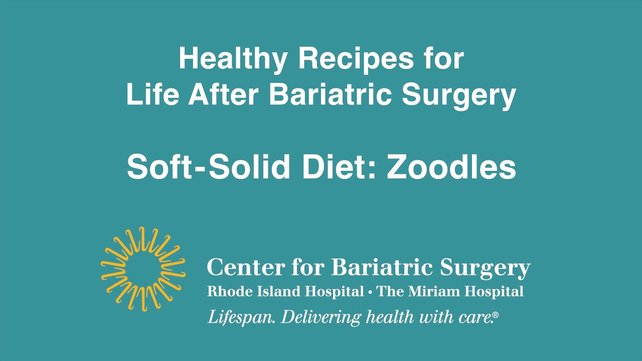The Importance of Hydration After Bariatric Surgery
Marcoandrea Giorgi, MD, bariatric surgeon, discusses the importance of staying well hydrated after bariatric surgery.

Congratulations on your decision to take additional steps to improve your quality of life.
Your bariatric surgery team is excited to share this journey with you. We are here to guide and support you, and we hope you find the content of this library helpful in creating healthy lifestyle habits.
Please remember that everybody is different, and the information presented here provides general guidelines; substitutions can be made to address your needs, so always consult with your medical care team if you have questions or concerns.
With bariatric surgery, the part of your stomach that food enters will become much smaller and is referred to as a “gastric pouch.” This pouch will be about one ounce in size.
After your surgery, your stomach will need time to heal. To help this healing process you will follow a diet progression that consists of four stages, starting with liquids only, transitioning to pureed foods, and eventually working toward soft solids and regular-textured foods to create a balanced diet.
This initial recovery period will also be a valuable time to adjust the style of your eating as you get used to having a smaller stomach.
Practice mindful eatings by taking small bites and eating very slowly. Allow yourself the opportunity to acknowledge what the new sense of “fullness” feels like in your small stomach.
For additional information on the stages of diet, watch the videos below, take notes, and contact your dietitian with questions or concerns.

Marcoandrea Giorgi, MD, bariatric surgeon, discusses the importance of staying well hydrated after bariatric surgery.
Water is essential to life, as it plays a role in almost every bodily function. Staying well hydrated can also promote bowel regularity and relief from constipation.
It’s critical in the early stages after your discharge from the hospital that you focus on your fluid intake in order to prevent dehydration and potential readmission.
Ask your registered dietitian or medical provider for more information on the importance of proper hydration after surgery. Please note that fluid needs are individual. Some people may require more fluid to maintain adequate hydration.
Check for common signs and symptoms of dehydration:
If you don’t like plain water, try these recipes we have prepared for you. These drinks are a delicious, healthful alternative that will help keep you well hydrated.




After your hospital discharge, you will be following a pureed diet for about four weeks while your stomach heals. During this time, you will also have the opportunity to meet with your dietitian to discuss when to start eating soft solid foods.
To help you navigate these four weeks, we have prepared short videos of recipes you can use as references for texture, portion sizes, and cooking tips.


After you have completed four weeks on the pureed diet stage, you will transition to soft solid foods. You can put your food processor away and take out the cooking pan.
This stage includes a variety of foods, such as soft poultry, meats, fish, cooked vegetables, and fresh fruits. During this stage, remember to keep foods moist and soft. Continue to incorporate high-protein foods and consume them first at meals. Increase the texture and variety of the foods slowly and as tolerated.
For more details on this stage of diet, make sure you consult with your dietitian. We hope the videos below inspire you to go to the kitchen and start cooking! Enjoy!


This stage of your diet typically starts six weeks after surgery and continues for the rest of your life.
At this point you can introduce roughage foods, nuts, bigger seeds (such as pumpkin or sunflower seeds), skin on apples/potatoes/pears, and uncooked/raw vegetables.
Try one food at a time to ensure tolerance. If you do not tolerate a particular food, put it back on your list to try again in couple of weeks. The goal is to choose a variety of healthy, balanced, and satisfying meals.
Continue to practice the concepts of mindful eating by taking small bites and chewing thoroughly before swallowing. The following videos will show you how healthy meals can be delicious and simple to prepare.


